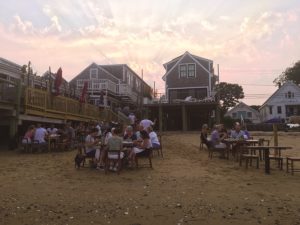PROVINCETOWN — The owner of Sal’s Place may not have to pay $78,499 in legal fees plus fines for putting restaurant tables on the beach behind her neighbor’s house.
In a major reversal of his previous rulings in the case, Land Court Judge Michael Vhay on Nov. 12 ordered all of the parties — restaurant owner Siobhan Carew, neighbor Gregory Connors, the Commonwealth of Massachusetts, and the Provincetown Zoning Board of Appeals — to negotiate an agreement among themselves.
Meanwhile, he has placed a stay on all related proceedings. That includes the collection of fees and fines the judge had previously imposed on Carew for violating his injunction forbidding her from serving patrons on the beach behind Connors’s home.
If the parties cannot reach a compromise by Dec. 17, he said, the case will need to be relitigated.
Vhay wrote in his latest decision that his previous injunction “rested on an incorrect premise.” That premise goes to the heart of why this case has aroused so much public interest.
The case began with two neighbors who do not get along and have been battling in court for six years. Last summer, things got complicated.
Because of the pandemic, the town issued a permit for Carew to seat people at tables in the intertidal zone behind Connors’s home; this was allowed under the town’s emergency order to help business owners who were losing out because of limits on indoor seating.
Later, in a conflict over who sets the rules for the area below the mean high tide line, Carew argued that the intertidal zone west of Howland Street is owned by the Commonwealth, making this part of Provincetown unusual. In the rest of the state, waterfront property owners own the land all the way to the mean low tide line.
But Vhay never made that distinction in his various rulings last summer. He imposed fines and ordered that Connors’s attorney fees be covered by Carew. Every time the legal team from Sal’s argued that the judge was missing the distinction about who owns the intertidal area, the judge refused to acknowledge it.
But that changed on Sept. 10, when an attorney working pro bono on behalf of a children’s sailing camp near the disputed area submitted an amicus curiae (friend of the court) brief, stating that the intertidal zone is owned by the state and not Connors.
Provincetown’s town counsel filed a similar brief. Then, on Oct. 22, the state attorney general followed suit, asserting that the state owns the intertidal zone and asking Vhay to correct his order.
Vhay said he would need to reconsider his earlier injunctions against Carew, because “now there is a big cloud hanging over” the case.
The judge also congratulated Karl Buch, the attorney for West End Racing Children’s Community Sailing, for bringing the matter to his attention.
“You should say, ‘mission accomplished,’ ” Vhay told Buch. “I appreciate your filing of this brief and you should be pleased that the proper parties are involved.”
Buch told Vhay that the sailing club, located at 94 Commercial St., is very close to Sal’s at 99 Commercial St. and Connors’s house at 101 Commercial St.

He said West End Racing became concerned that the decision would affect the club. If a precedent were set finding that intertidal lands are held by private property owners down to mean low water, Buch said, the moorings that the sailing club uses could be lost, because they are in the intertidal lands behind neighbors’ properties.
The town’s attorney, Amy Kwesell of KP Law, urged Vhay to allow the town to participate in mediation because the town has been drawn into this and other legal battles between Carew and Connors for years. Following the ZBA’s original permit allowing the restaurant to use the intertidal zone behind Connors’s home, the select board stood by Sal’s this summer by refusing to amend that permit, even after Kwesell advised the board to honor Vhay’s injunction.
“When things happen at 101 Commercial St. or 99 Commercial St., the Provincetown police get called, the conservation agent gets called, the building commissioner gets called, the assistant town manager gets called, and, last but not least, the town manager gets called,” Kwesell said. “No one would like to see a settlement more than the town of Provincetown.”
Attorney Jamy Madeja, representing Sal’s, said in court that the restaurant’s owner never argued that she wants a restaurant on the beach long-term. The only relevant matter is whether she could serve patrons on the beach under the town’s and Gov. Baker’s allowances to use public land for business seating during the pandemic.
Attorneys on all sides declined the Independent’s requests for comment. They all did agree to try mediation, although another of Carew’s attorneys, Anthony Panebianco, cautioned that there is significant animosity built up between the parties.



